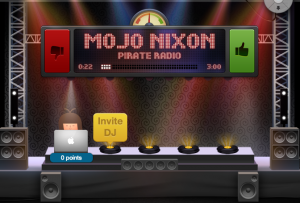Maybe it’s because spring is in the air in North America, but pirate radio is bubbling up a bit in the popular consciousness, as well as the FCC’s. Seems like a good time for a pirate radio news round up.
 Albuquerque’s Alibi hazily reports on “at least one station operating without a license” in Northern New Mexico. That station’s twist is that it broadcasts a room on turntable.fm, where any user can take a turn playing DJ on the station, no matter where she is located.
Albuquerque’s Alibi hazily reports on “at least one station operating without a license” in Northern New Mexico. That station’s twist is that it broadcasts a room on turntable.fm, where any user can take a turn playing DJ on the station, no matter where she is located.
Long before the advent of turntable.fm or SoundCloud unlicensed stations have been experimenting with programming supplied by listeners. Pre-internet stations would accept messages recorded anonymously to a voicemail system or even snail mailed on tape to post office boxes. In the early 2000s–before the term “user-generated content” crossed the lips of marketers–Seattle’s Black Ball Radio and Minneapolis’ 2000 Flushes broadcast MP3s uploaded to their websites. Services like turntable.fm make it even easier to do this, although such sites exclude recordings made by listeners, since they feature only commercially released music.
ArtSlant Los Angeles recently published a brief overview of recent transmission art and unlicensed radio projects, inspired by the Miami-based Electric Lunch operated by art Patricia Margarita Hernandez. Even though Hernandez’s storefront station is online-only, writer Amanda Sanfilippo draws an explicit connection to Miami’s rich pirate radio scene.
Speaking of Miami, in the last few weeks the FCC has touted fines issues to unlicensed operators in that particular hotbed, in addition to Princeville, Oregon.
The Oregon fine followed up on a notice of apparent liability issued in July, 2012, to a man who apparently (and foolishly) let in an FCC agent, who was accompanied by a local police officer, to inspect his station inside his residence. It only took the Commission 10 months to take the next step with this low-hanging fruit.
The FCC moved a little more quickly on the two Florida cases. Last notice to both operators occurred in February of this year, following up on visits made in 2012. In one case the broadcaster also let FCC agents inspect his station. In the other case the station–being fed a stream from a laptop over the internet–was located in a commercial property where the owner gave agents access. With this latter instance the FCC was acting on complaints from the FAA alleging interference with aircraft bands.
There’s no mention of warrants to obtain entry or confiscate equipment in any of these cases, even in Oregon where a local cop tagged along. Things would have been more complicated for the FCC if their knock at the door simply had been ignored.
An interesting side note is that the Commission’s press releases for these actions all used the term “pirate broadcaster,” as in, “Pirate Broadcaster Bozo T. Clown (Miami, Florida); Fined $15,000.” I don’t recall the FCC using the term “pirate” much in the past, so I searched through the Enforcement Bureau’s press releases for the last 13 years and found that the word was used just once in a 2001 press release, and then didn’t reenter the Commission’s everyday vernacular again until May, 2011. Now it appears to be the preferred nomenclature.
I don’t know if this change in terminology if meaningful or reflects an attempt by the FCC to differentiate unlicensed broadcasters from other unlicensed radio activity in other services. Certainly, using the term “pirate” is more comprehensible to the general public, which may aid the Commission’s ability to get a little more press for its enforcement efforts. It just seems a little less officious and bureaucratic to me.


